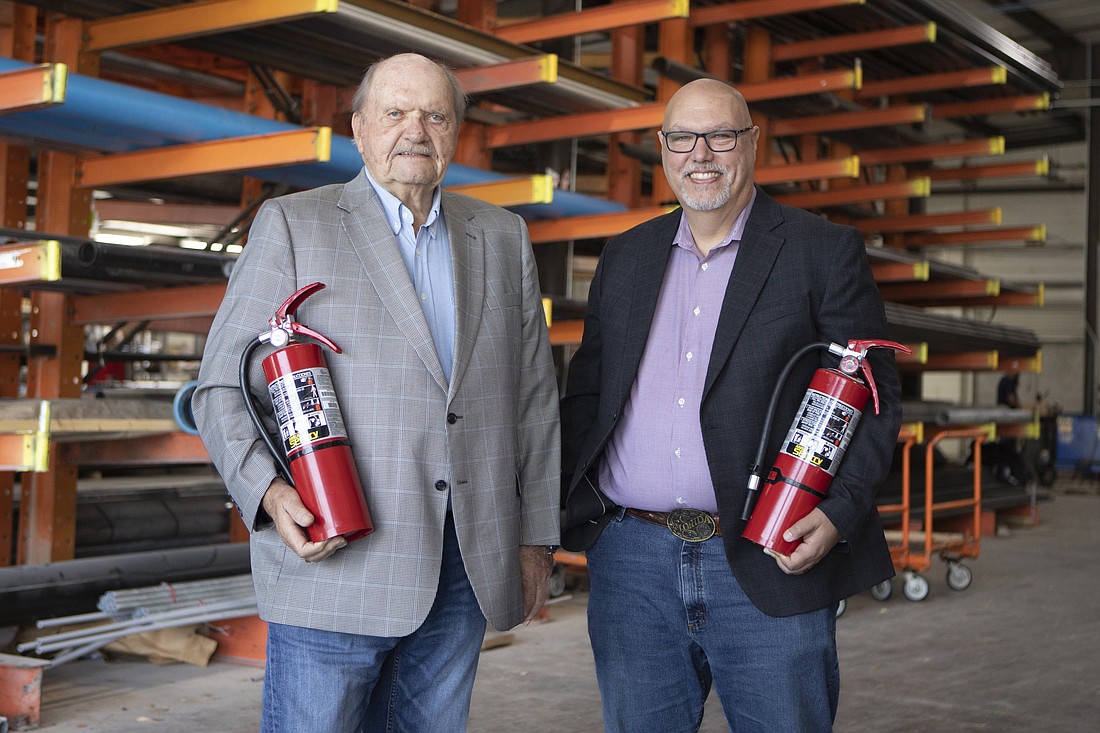- July 26, 2024
-
-
Loading

Loading

Chris Johnson wanted to go to college and become an engineer instead of working for Piper Fire Protection, the Clearwater-based company his father Terry founded in 1986, a few years after moving the family to Florida. His plan almost worked.
Chris, 54, earned an associate’s degree from St. Pete College and then enrolled at the University of Florida. To help pay for tuition, he worked as a bartender. Yet he liked that so much he dropped out of school to focus on developing a career in the bar and restaurant industry.
In 1993, Chris met the woman who would become his wife, “and she basically said, ‘I really like you, but I’m not going to marry a bartender,’” he recalls. So, in 1994, he returned home and joined the family business, which, at the time, was a modest operation, to say the least.
| Year | Revenue | % Change |
|---|---|---|
| 2020 | $22.5M | - |
| 2021 | $21.8M | -3.1% |
| 2022 | $26.2M | 20.0% |
| 2023 (projected) | $30M | 14.5% |
“My father had one part-time guy working for him,” Chris says. “I was employee number three. He had a small service and inspection business with about 65 to 70 clients, mostly in Indian Rocks Beach, Clearwater, St. Pete, that area. The year that I joined, I think we did about $50,000” in sales.
But to quote Bruce Springsteen, from small things big things one day come: Today, Piper Fire Protection has 220 employees and provides a wide range of products and services related to fire prevention and safety, including inspections and design and installation of fire alarm and sprinkler systems. It has satellite offices in Sarasota and Tampa and recently added a new division that can handle high-voltage electrical work. It did $26.2 million in revenue in 2022, up 20% from $21.8 million in 2021.
“I never wanted to be dependent on construction,” Chris says. “We've focused on having a balanced approach. In our business, we are about 65% service and inspection and about 30-35% construction.”
The company’s growth under Chris’s leadership has attracted many suitors over the years, but he rebuffed them all — until recently. In March, Piper announced it had agreed to be acquired by Fortis Fire & Safety, a new holding company, focused on fire protection services, that was founded in 2021 by Imperial Capital, a Toronto-based private equity firm. Fortis, thus far, has acquired one other company in Florida and four in California.
“We were not looking for a deal,” Chris says. “We’d let somebody give us a valuation of what they think we’re worth, but we had not seriously considered it. But I met the guys from Imperial Capital about two and a half years ago and started talking to them before they’d even started in Florida, when they didn’t even have a name yet.”
Selling the company, Chris says, was “one of the toughest decisions” he’s ever made. But the way he arrived at that choice involved a carefully thought-out process that other family-owned businesses might want to consider.
Piper has adopted a sort of two-tiered organizational structure and decision-making process. The company has an executive board made up of Chris, Terry and Don O'Lone, a Piper Fire Protection minority owner and longtime friend of the younger Johnson. Notably absent are Chris’s siblings, who are technically minority owners of the company, but their stock is being held in trust by Terry.
“They’ve never served as board members,” Chris says, “but we have family board meetings where we talk about what they’re seeing from their different seats in the company. It’s a little looser than a typical board meeting, but it gives everyone a chance to express concerns, and I get a chance to answer questions that are perhaps more family-centric.”
Chris says that setup creates a layer of separation that prevents “family favoritism” from creeping into the workplace. While his brother Joe is a department head and reports to Chris, his other siblings have “bosses that aren’t me,” he explains. “That’s worked out well — it keeps us at arm’s length as far as the hierarchy goes.”
The result is Piper Fire Protection speaks with one voice when it comes to big decisions — and no decision is bigger than the one Chris just made. But that doesn’t mean he arrived at it on his own.
“Until the deal was done, I was listening to what everyone was saying,” he says. “I'm a leader who, if somebody’s not comfortable with a decision, I want to talk about it until they get comfortable or I'm convinced that it's a bad decision. So, we weren't going to move forward unless we were all like-minded.”
He adds, “I've learned that whenever I get a bit in my teeth and I move forward without my whole team on board, then I'm probably making a bad decision.”